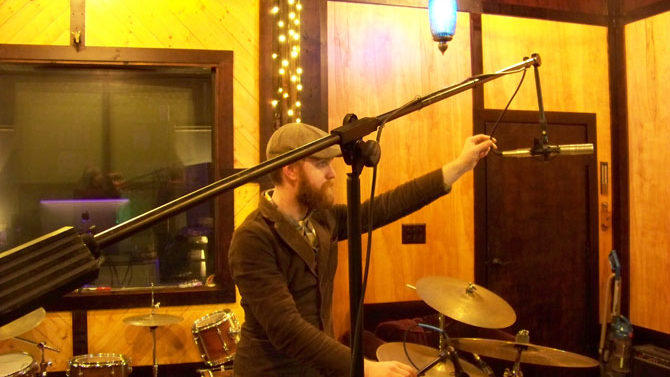This is the first installment in Flagpole’s series of year-end music coverage. We will continue next week with a collection of Athenians’ favorite musical moments of 2013 and conclude on Jan. 8 with our Top 10 albums list.
If I can gush for a sec: In my first full calendar year as Flagpole‘s music editor, it has been inspiring to watch the various pieces of the local creative community intersect and interact, providing support to one another even as friendly competition mandates they must remain separate, at least on paper. On my end, the challenge of conveying the greatness of Athens music to the world has been made infinitely simpler because of the creative fertility this amazing ecosystem inspires. Put bluntly, y’all make my job easy.
With 2014 looming, we figured it was a good time to look back on our town’s collective accomplishments. So, we set out to answer a question: What defined Athens music in 2013? Of course, any answer is unfair from the start. By necessity of space (and sanity), important segments of the scene had to be omitted.
To name just a few things we had to leave out: In 2013, the local jazz scene began to skew younger and more heterogeneous, providing an increasingly subversive soundtrack to Athens’ coffee-house culture. The Gypsy Farm crew continued its dominance, providing us with endless variations on the screeching garage-punk we know and love so well and even branching out into unexpected arenas, like bluegrass and comedy. Nurtured by avant-pop patriarch Mercer West, an elusive sect set up shop at Go Bar, hosting million-band freakouts and weekly open-mic nights that encouraged experimentation over recitation.
In addition to the more party-friendly strains of dance music that wafted through downtown streets, blissful drone and contemplative ambient music took the local electronic world by storm. Meanwhile, the punk scene stayed mercifully steady, while the hip hop community, led by chart-destined rappers like Tony B, was bolstered by artist-centric organizations like Blue Up and Infamous Entertainment.
Recording studios stayed busier than ever, tracking countless albums and EPs by local acts as well as national heavyweights. Nonprofits like Nuçi’s Space, AthFest Educates and We’re hEAR for You continued providing indispensable services to local creative types. Many of our longstanding clubs boasted their most impressive lineups in years, and a handful of eclectic new venues entered the fray, to decidedly wonderful results.
So, rather than try to include everyone on this list, we decided to zero in on a few iconic examples of what made Athens music special in 2013. From a nationally renowned label investing in local culture, to a scrappy studio having a breakout year, to good music being found in increasingly strange places and artistic collectives rewriting the rules of our town, here are six developments we feel defined us as a community this year. We hope these examples will provide a small glimpse into the wealth and complexity of our beloved scene. [Gabe Vodicka]
1. One Guy, a Goal and a Pizza Place
When word broke this past September that the new Pizza Hut on Baxter Street was opening a listening room, public reaction ranged from curiosity to guffawing. To say that the spot, now dubbed The Hut, has exceeded expectations would be an understatement. Presented under the simple banner of being “not your typical Pizza Hut,” the space is now a place local artists now actively pursue gigs and folks regularly gather to hear their friends and favorites.
The Hut is operated under the direction of Bruce Moshe “Mo” Lutz, who says, “I wanted a room where singer-songwriters could come showcase their material [to] a laid-back, appreciative audience. And [I wanted] the musicians to be paid reasonably.” In its few months of existence, The Hut has featured an impressive lineup of performers, including locals Matt Hudgins, Scott Baxendale, Jack Logan and Ken Will Morton, as well as touring musicians like jazz guitarist Philippe Bertaud and bluesy scene legend Anna Hamilton.
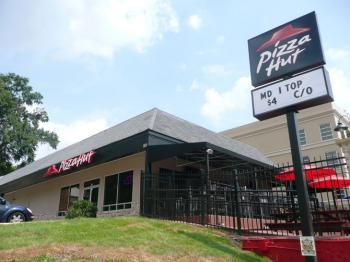
A good earmark of any decent space is musicians wanting to return. Lutz reports that repeat bookings are often requested; a quick chat with anyone who’s played The Hut will reveal the same. “After about a month, when folks started realizing we were offering a serious listening room… it sort of took off,” says Lutz. “The musicians asked to come back, because The Hut gives them what they want: a serious venue catering to [them].”
The Hut is far from the first pizza restaurant in Athens history to offer live music (it’s not even the first on Baxter Street). But there’s no denying that it got people talking this fall, widening eyes to the artistic potential in the sort of spaces that are driven by everyday and never considered. Sure, Pizza Hut doesn’t challenge the dominant cultural paradigm—but a listening room inside a Pizza Hut in Athens, GA? That’s something to think about.
Lutz speaks of his space with a sort of wide-eyed excitement and an attitude that nearly anything is possible. “We want to set the bar higher with [even more] diversified acts,” he says. ”I’d also like to pursue radio and television programming through local media. I’d like to host CD and album release parties, too. It’s a matter of getting it organized one step at a time. We [want] to have a sweet little oasis of art appreciation and [offer] a nice alternative to the status quo.”
And while there are certain business needs that must be met to continue, Lutz has a clear and simple path he plans to follow. “We really only have one expectation,“ he says. “That’s to do things right the first time. [After that], the rest will fall in line.” [Gordon Lamb]
2. A Lesson on #CrushingIt
“It started as a joke thing,” says rapper Dwayne “JuBee” Webb, who fronts local funk-hop heavyweights JuBee and the Morning After and, along with several members of the local electronic-music community, started the promotions-minded collective CrushTeam—or #CrushTeam, if you wanna get all Twitty with it. “We were booking all these shows together during the summer, starting during AthFest. We did a show and it crushed,” says Webb, laughing. “It was a huge success. We did a couple more after that, and people started being, like, ‘Everything y’all do together, you just crush it’.”
CrushTeam’s turning point came when a warehouse party the group hosted after EDM superstar Pretty Lights’ sold-out Georgia Theatre show went viral (but, y’know, in real life). Since the instantly legendary rager, says Webb, “People know what we do. They’re like, ‘We heard you guys get down’.” But CrushTeam isn’t just about mindless partying. Rather, Webb and company aim to build a lattice of like-minded artists in Athens and elsewhere with the goal of connecting it all under one umbrella, or, as Webb says, “[building] all of our individual networks through this one huge network.”
Recent events—like the BeATHlanta happening, which, as the endearingly clunky title suggests, brought some of the hottest Athens and Atlanta acts together for a night of collaborative mayhem, or the increasingly frequent series of festival-esque shows put on by CrushTeam and its unofficial indie-rock sister organization, Freeklife—have brought a raucous house-party vibe to downtown clubs, taking the threat of police interference out of the equation and reminding oldster townies that music can be fun.
CrushTeam has also made strides in uniting the organizationally challenged EDM community, its own stable of house DJs like Robbie Dude, Andy Bruh and Will Weber leading a charge that dozens of other aspiring beatmakers and producers have begun to follow. But perhaps most importantly, the Crushers have set out to blur lines. For Webb, a Brooklyn, NY native who cut his teeth in the tight-knit Macon, GA music community, where he says genre mattered less than talent or energy, CrushTeam is an opportunity to bridge those cavernous gaps that have kept Athens’ many microscenes separate for so long.
“I never saw myself being one of those scene kids who goes to [a certain] type of event and looks down on other things going on,” Webb says. “I wanna be able to go to the 40 Watt as much as I go to New Earth. I wanna be able to go hang out at Flicker and then go kick it at Nowhere Bar, and it not be a thing.” Athens: Ya heard? [GV]
3. The Prince Avenue Effect
“The shows are too damn late.” The complaint has echoed through this town for as long as there has been music to see and people with children and nine-to-fives who want to see it. You might even say Athens’ late-night lifestyle is one of the primary reasons many of those who study here eventually feel like they’ve aged out of this place and have to move away (well, that and the lack of good jobs to be had). The fact is, if you want to stick around town and enjoy the trappings of a grown-up life, live music must inevitably take a smaller and smaller role, as seeing bands who take the stage at midnight becomes more difficult to justify.
Seth Hendershot sought to address that problem when Hendershot’s Coffee Bar opened a few years ago on Oglethorpe Avenue. “Our intention, from the beginning, was to appeal to the 30-something, 40-something crowd,” Hendershot says. “We have kids and jobs, and every once in a while, we do the 2 a.m. thing. I don’t want to stop going out and seeing shows! [We thought], ‘There should be a place where you can go out and have a few beers and see some music or some comedy, and get home before midnight’.”
But it’s just since the venue’s summer 2013 move to the Bottleworks on Prince Avenue—a move that arose from a lease dispute with its former landlords—that Hendershot’s role as an anchor of public life for the married-with-kids set has begun to solidify. “I didn’t realize, when we opened in the old location, that it was so hard for anybody in [the Normaltown/Prince] area to make it over there,” Hendershot says. Since the move, he’s noticed better attendance at shows, which he says the venue is “getting better” at keeping to a prompt 8 p.m. start time, crediting the growth to factors as diverse as an improved sound system and property owners who appreciate Athenians’ love of localism to creeping corporatism downtown and the Bottleworks’ abundant parking.
Still, it wouldn’t work if the environment wasn’t right. Hendershot has concentrated his efforts on bringing in diverse acts and cultivating his business as a place where the performer is respected. “That’s why our tagline is ‘Just Listen,’ he says. “We want to be the kind of venue other musicians say is a good place to play.”
He’s also happy to be part of the burgeoning Prince corridor. As bigger corporations infringe on downtown, the “keep Athens weird” crowd has increasingly chosen Prince as a destination—from new additions The Old Pal and Hi-Lo Lounge to more established spots like Double Dutch Press and Rocket Salon (and, come January, Flagpole). “The lifers are in that area,” Hendershot notes.
But you don’t have to be a lifer to enjoy the vibe at a spot like Hendershot’s. An appreciation of good drinks, community, those who take pride in presenting music well and getting to bed at a reasonable hour are plenty enough. [Rachel Bailey]
4. Everybody Get Together
It could ostensibly be seen as ironic—don’tcha think?—that it took a pair of outsiders to unify Athens’ hip hop scene. But, to our town’s credit, most of the legwork had already been done by the time Knowa Logic and Jasmine Johnson rolled into the Classic City. Those two just supplied the vision.
Of course, that vision was no small potatoes, either. To Logic and Johnson, who had cut their teeth in the well-oiled central Florida hip hop world before relocating to Clarke County, fresh eyes revealed a crucial lack of involvement and support from Athens’ various businesses and media outlets—including Flagpole.
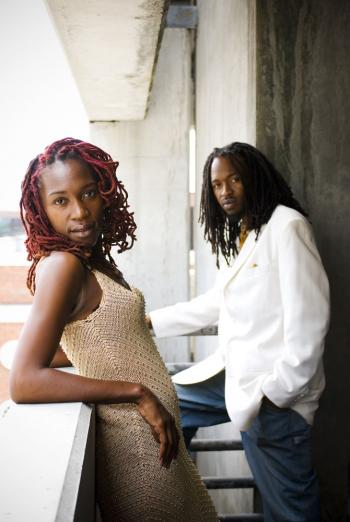
Jasmine Johnson and Knowa Logic
“Athens seems to have a disenfranchised hip hop scene,” Logic told us in April. “Partly because the artists and business owners who carry the spirit of the town’s history are not involved enough—and, in some cases, [not] invited. So, we wanted to make sure they’re included. We don’t want to separate the community; we want to bring everyone together [and make] it stronger.”
Logic and Johnson, who operate the promotions group United Group of Artists (UGA) Live, conceived of the Athens Hip Hop Awards, held at the Georgia Center’s Mahler Hall this spring, as an event to celebrate not only the DJs and MCs who make up the wildly multifarious local hip hop scene, but also the mostly black-owned businesses—barbershops, soul food restaurants, promotions agencies—that constantly lend it underlying support.
“Folks like Logic and Johnson who blow into town and try to make things happen often wind up alienating the very people they’re ostensibly supporting,” wrote Flagpole’s Gordon Lamb in his astute feature on the awards. “But UGA Live seems committed to the idea of hip hop as community, and is actively embracing those who have long been shaking things up in Athens.”
Indeed, the ceremony recognized other key figures on the local scene: Longtime crusader Montu Miller, for instance, was justly given the Hip Hop Advocate award.
For Johnson, who told Flagpole back in April the goal of the awards was “changing people’s perspective on Athens’ hip hop scene,” it feels like much has already been accomplished. “A lot of people reached out to us after last year’s awards to say they appreciated what we did for the city,” she says. Since the ceremony, she adds, “We have witnessed more artists on their grind, pushing their music. [We] have seen some unity.”
Indeed, far from alienating anyone, the first awards was such an enormous success it has become an annual happening. On Feb. 23, the event will return to UGA’s campus to again serve out much-needed acknowledgement to those who work to remind the world Athens isn’t only about indie rock and Americana. “It gives artists in the community something to look forward to,” says Johnson. [GV]
5. A Signature Sound Found in a Dark Room
“I’ve been working 12-hour days,” says Jesse Mangum with a laugh. “It’s just me in this dark room by myself. I bought a hamster just to hang out with me in the control room.” The local engineer has been running The Glow Recording Studio in some form since 2007, though it moved to its current location, off Jefferson River Road, in January of 2012.
By all measures, 2013 has been a breakout year for The Glow. Mangum (full disclosure: his wife Jessica is a Flagpole employee) worked on some of his highest-profile projects to date, including helming an upcoming LP from indie-pop buzz band Black Kids and recording and mixing the majority of Elf Power’s latest, Sunlight on the Moon. But he also helped foster the development of a host of young talent; most notably, The Glow became the de facto studio headquarters of the Birdhouse Collection, which pumped out a slew of borderline-brilliant recordings before its dissolution midyear.
One Birdhouse alum, K. Jared Collins of k i d s, describes Mangum as “a professional. The last time we recorded, it was done in three hours. And it was the first time I didn’t, like, go fuck it up on my own afterwards, either.”
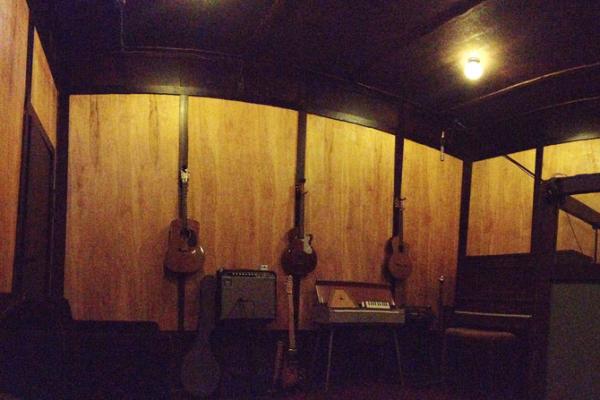
Mangum has spent the greater part of the past year developing his studio’s signature sound. “I like distorting everything I can,” he says, while also noting that he opts for analog equipment in lieu of digital plugins—even if said equipment gets a bad rap by other gearheads. “I’ll look for reviews on various things… and I’ll find something that gets really bad reviews, knowing that it’s still gotta have some application where it sounds great,” he says. “I have a whole rack of gear that’s just hated on.”
That sense of ingenuity lends the music that comes out of The Glow a distinctly human feel; it’s no coincidence that Sunlight on the Moon (parts of which were also recorded at Gypsy Farm and frontman Andrew Rieger’s home studio) was Elf Power’s most vital outing in years.
Next up for Mangum is an EP-only record label, for which he will act as CEO and producer. He explains that he wants to continue developing a distinct Glow sound—becoming “less passive” as an engineer—while making it easier for his favorite local bands get their music out to the world, citing Motown and Stax as inspirations. An impressive but as-yet-unconfirmed cadre of groups is reportedly on board with the project. For now, Mangum is content to continue tackling an ever-growing list of studio engagements.
“So far, it’s all been word of mouth. There’s something about what I do that [people] like,” he says. “There’s something going on [at the studio] every single day. I couldn’t have even imagined that a year ago.” [GV]
6. New West Comes East
From its unassuming offices inside the old Salvation Army building at 399 Meigs St., New West Records, and its attached concert space, Normaltown Hall, quietly, yet deliberately and affectionately, fortified the Athens scene in 2013. Envisioned by New West’s George Fontaine, Jr. and Director of Project Management Tommy Robinson, Normaltown Hall began quite literally in the building’s basement.
Promoter Jay Steele says, “[It started with] dimly lit acoustic song-swaps in the basement, a.k.a. the dungeon. Those were enchanting in a barebones/bare-all sort of way, but Tommy had the vision to take it to another level. Whole-hog.”
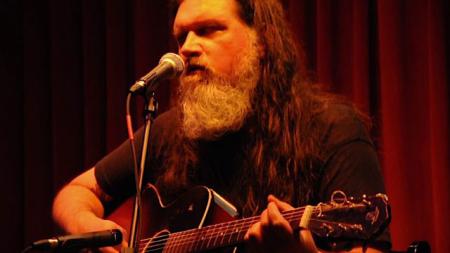
Richard Buckner at Normaltown Hall
Since moving to the building’s main floor, the space has hosted shows by names such as Will Johnson, Richard Buckner and Art Rosenbaum, as well as artists on New West’s Athens-centric Normaltown Records imprint, like White Violet and New Madrid. Robinson says, “We wanted to create a space for our artists and bands to come and rehearse and demo songs… We also envisioned the space as a town-hall type of room, where the community could get together under one roof to meet and enjoy music.”
So far, the music has been programmed by Robinson and Steele and promoted via Steele’s multi-tasking arts undertaking, Athens Provisions. Audiences at Normaltown Hall tend to be filled with serious music fans who are more involved in actually listening than letting the music buzz in the background. The nonstop Athens party atmosphere is largely absent here, as the Hall serves no alcohol. “We are still BYOB,” says Robinson. “We have a pretty decent built-in crowd who know this policy and respect it. We don’t get too wild or crazy, but we let people kick back and enjoy themselves, as long as it doesn’t interrupt the performance.”
Robinson adds that the space is “constantly evolving” and that organizers learn more with each show. “We are starting to style the room to develop the vibe a little bit more,” he says. “[New West associate] Dirtty Toes Productions has beefed up their production as well. They film every show and create videos that we can use to market the room. The artists dig those, too, because its a free video that is really well done,“ he says. “We try and ask, ‘What can we do better?’ after every show.”
New West already had a solid presence in the American music scene, boasting major artists like Dwight Yoakam and Steve Earle, before opening its Athens office, the third for the label. Fontaine and company work actively with AthFest, the Slingshot festival and the Music Business Certificate Program at UGA, making clear their commitment—not just being in Athens, but being of Athens.
“We also have offices in Burbank, CA, Austin [TX] and Houston,” says Robinson. “Athens is a much smaller town, but it still has that big-city heart when it comes to music. I mean, there are 10 packed-out clubs on any given night with awesome national and local bands. [There’s a] great college radio station, great clubs, great booking agents, awesome studios and tons of musicians. Our presence in a scene like this is a really cool thing for me.”
It’s a pretty cool thing for Athens, too. [GL]
Like what you just read? Support Flagpole by making a donation today. Every dollar you give helps fund our ongoing mission to provide Athens with quality, independent journalism.



